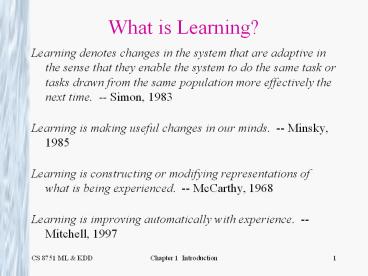What is Learning? - PowerPoint PPT Presentation
Title:
What is Learning?
Description:
What is Learning? Learning denotes changes in the system that are adaptive in the sense that they enable the system to do the same task or tasks drawn from the same ... – PowerPoint PPT presentation
Number of Views:76
Avg rating:3.0/5.0
Title: What is Learning?
1
What is Learning?
- Learning denotes changes in the system that are
adaptive in the sense that they enable the system
to do the same task or tasks drawn from the same
population more effectively the next time. --
Simon, 1983 - Learning is making useful changes in our minds.
-- Minsky, 1985 - Learning is constructing or modifying
representations of what is being experienced. --
McCarthy, 1968 - Learning is improving automatically with
experience. -- Mitchell, 1997
2
Why Machine Learning?
- Data, Data, DATA!!!
- Examples
- World wide web
- Human genome project
- Business data (WalMart sales baskets)
- Idea sift heap of data for nuggets of knowledge
- Some tasks beyond programming
- Example driving
- Idea learn by doing/watching/practicing (like
humans) - Customizing software
- Example web browsing for news information
- Idea observe user tendencies and incorporate
3
Analysis/Prediction Problems
- What kind of direct mail customers buy?
- What products will/wont customers buy?
- What changes will cause a customer to leave a
bank? - What are the characteristics of a gene?
- Does a picture contain an object (does a picture
of space contain a metereorite -- especially one
heading towards us)? - Lots more
4
Tasks too Hard to Program
- ALVINN Pomerleau drives 70 MPH on highways
5
STANLEY Stanford Racing
- http//www.stanfordracing.org
- Sebastian Thruns Stanley Racing program
- Winner of the DARPA grand challenge
- Incorporated learning/learned components with
planning and vision components
6
Software that Customizes to User
7
Some Areas of Machine Learning
- Inductive Learning inferring new knowledge from
observations (not guaranteed correct) - Concept/Classification Learning - identify
characteristics of class members (e.g., what
makes a CS class fun, what makes a customer buy,
etc.) - Unsupervised Learning - examine data to infer new
characteristics (e.g., break chemicals into
similar groups, infer new mathematical rule,
etc.) - Reinforcement Learning - learn appropriate moves
to achieve delayed goal (e.g., win a game of
Checkers, perform a robot task, etc.) - Deductive Learning recombine existing knowledge
to more effectively solve problems
8
Classification/Concept Learning
- What characteristic(s) predict a smile?
- Variation on Sesame Street game why are these
things a lot like the others (or not)? - ML Approach infer model (characteristics that
indicate) of why a face is/is not smiling
9
Unsupervised Learning
- Clustering - group points into classes
- Other ideas
- look for mathematical relationships between
features - look for anomalies in data bases (data that does
not fit)
10
Reinforcement Learning
- Problem feedback (reinforcements) are delayed -
how to value intermediate (no goal states) - Idea online dynamic programming to produce
policy function - Policy action taken leads to highest future
reinforcement (if policy followed)
11
Analytical Learning
- During search processes (planning, etc.) remember
work involved in solving tough problems - Reuse the acquired knowledge when presented with
similar problems in the future (avoid bad
decisions)
12
The Present in Machine Learning
- The tip of the iceberg
- First-generation algorithms neural nets,
decision trees, regression, support vector
machines, - Composite algorithms - ensembles
- Significant work on assessing effectiveness,
limits - Applied to simple data bases
- Budding industry (especially in data mining)
13
The Future of Machine Learning
- Lots of areas of impact
- Learn across multiple data bases, as well as web
and news feeds - Learn across multi-media data
- Cumulative, lifelong learning
- Agents with learning embedded
- Programming languages with learning embedded?
- Learning by active experimentation
14
What is Knowledge Discovery in Databases (i.e.,
Data Mining)?
- Depends on who you ask
- General idea the analysis of large amounts of
data (and therefore efficiency is an issue) - Interfaces several areas, notably machine
learning and database systems - Lots of perspectives
- ML learning where efficiency matters
- DBMS extended techniques for analysis of raw
data, automatic production of knowledge - What is all the hubbub?
- Companies make lots of money with it (e.g.,
WalMart)
15
Related Disciplines
- Artificial Intelligence
- Statistics
- Psychology and neurobiology
- Bioinformatics and Medical Informatics
- Philosophy
- Computational complexity theory
- Control theory
- Information theory
- Database Systems
- ...
16
Issues in Machine Learning
- What algorithms can approximate functions well
(and when)? - How does number of training examples influence
accuracy? - How does complexity of hypothesis representation
impact it? - How does noisy data influence accuracy?
- What are the theoretical limits of learnability?
- How can prior knowledge of learner help?
- What clues can we get from biological learning
systems?































